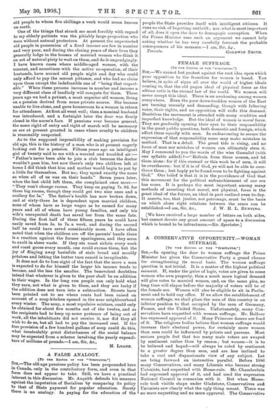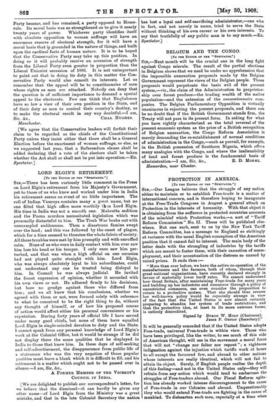A CONSERVATIVE OPPORTUNITY.—WOMAN SUFFRAGE.
[TO TIM EDITOR Or TUN "SPEOTATOR.1
Sin,—In opening the door to woman suffrage the Prime Minister has given the Conservative Party a grand chance for strengthening its moral basis. The woman suffrage question is not trivial. It is a matter of the highest political moment. If, under the guise of logic, votes are given to some women who own property, then a much more logical demand will give votes to married women, and, on the same plea, no long time will elapse before the majority of voters will be of the female sex. Women will also be eligible to sit in Parlia- ment and to bold any office. If we allow the establishment of woman suffrage, we shall place the men of this country in an inferior position to that occupied by the men of Germany, France, and the United States. Unfortunately, many Con- servatives have coquetted with woman suffrage. Mr. Balfour has expressed approval of it. Many Primrose dames are fond of it. The religious bodies believe that woman suffrage would increase their electoral power, for certainly more women than men could be influenced by priests and parsons. Most serious people feel that too many male voters are swayed by sentiment rather than by reason ; but women—it is to be believed and hoped—will always be ruled by sentiment to a greater degree than men, and are less inclined to take a cool and dispassionate view of any subject. Let me bring forward an instructive parallel. Before 1886 many Conservatives, and many Liberals who became strong Unionists, had coquetted with Home-rule. Mr. Chamberlain had expressed approval of it, and had used the expression National Council in connexion with it. But when Home. rule took visible shape under Gladstone, Conservatives and Unionists saw clearly what the ugly thing meant. There was no more coquetting and no more approval. The Conservative
Party became, and has remained, a party opposed to Home- rule. Its moral basis was so strengthened as to give it nearly twenty years of power. Whichever party identifies itself with absolute opposition to woman suffrage will have an enormous reserve of electoral strength, for it will have a moral basis that 4 grounded in the nature of things, and built upon the cardinal facts of human nature. It is to be hoped that the Conservative Party may take up this position. In doing so it will probably receive an accession of strength from the Liberal Party even greater in proportion than the Liberal Unionist secession of 1886. It is not unimportant to point out that in doing its duty in this matter the Con- servative Party would also consult its interests. Let us remember that the appeal will be to constituencies of men whose rights as men are attacked. Nobody can deny that the question is of sufficient importance to demand a special appeal to the electorate. Few can think that Englishmen have so low a view of their own position in the State, and of their duty as men to control their country's destiny, as to make the electoral result in any way doubtful.—I am,
Manchester.
[We agree that the Conservative leaders will forfeit their claim to be regarded as the chiefs of the Constitutional Party unless they insist either that there shall be a General Election before the enactment of woman suffrage, or else, as we suggested last year, that a Referendum clause shall be added declaring that a vote of the electors shall be taken whether the Act shall or shall not be put into operation.—En.
Spectator.]







































 Previous page
Previous page